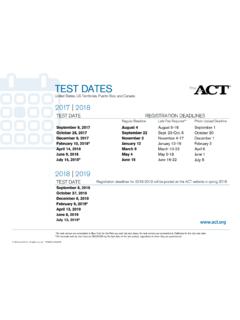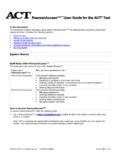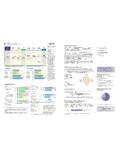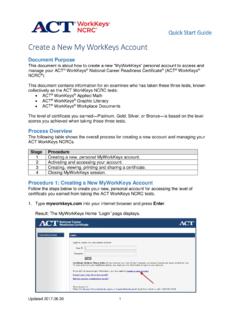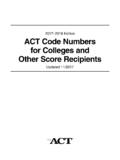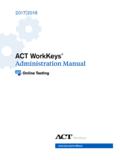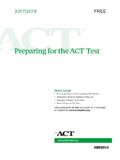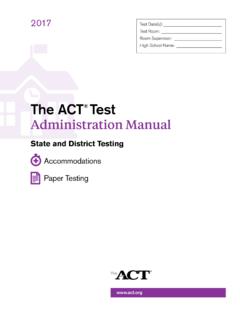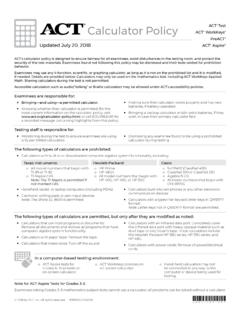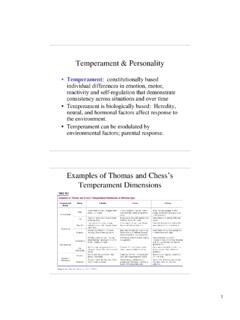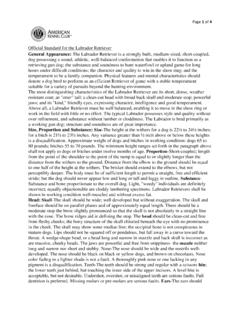Transcription of Cognitive and noncognitive skills - ACT
1 An information brief on the ACT WorkKeys system . KEY FACTS. Cognitive and The ACT WorkKeys assessment system noncognitive skills measures job skills that are valuable for any occupation skilled or professional Why do ACT WorkKeys assessments measure two types at any level and in any industry. of foundational skills ? The ACT WorkKeys suite of assessments measures two types of foundational skills : Cognitive and noncognitive . Although these assessments measure different constructs and rely on different designs, they produce results that complement each other. Cognitive and noncognitive foundational skills are integral to the industry competency The ACT National Career Readiness Certificate is an industry-recognized, models developed by the US Department of Labor and are applicable across all portable, evidence-based credential that sectors of the economy.
2 Combining two distinct skill areas gives employers valuable certifies achievement of foundational information that improves decision making related to recruitment, selection, promotion, skills essential for workplace success. and training and development. This information also helps career seekers and current employees to identify their strengths as well as the areas they should focus on improving. ACT's portfolio of work-related products includes instruments that measure both types of foundational skills . Cognitive vs. noncognitive skills : What's the difference? What are the ACT WorkKeys Cognitive and noncognitive Cognitive skills involve conscious intellectual effort, such as thinking, reasoning, skill assessments? or remembering.
3 ACT WorkKeys assessments that measure these skills require The Cognitive skill assessments are: examinees to demonstrate their capabilities in areas including reading and Applied Mathematics mathematics. Applied Technology noncognitive or soft skills are related to motivation, integrity, and interpersonal Business Writing interaction. They may also involve intellect, but more indirectly and less consciously Listening for Understanding than Cognitive skills . Soft skills are associated with an individual's personality, Locating Information temperament , and attitudes. For virtually all jobs, a worker needs the soft skills Reading for Information associated with working well with other people and functioning effectively in a work Teamwork environment.
4 The ACT WorkKeys noncognitive assessments measure the soft skills Workplace Observation that are considered essential in many occupations. The noncognitive skill assessments are: Fit Cognitive vs. noncognitive skill assessments: What do Performance they measure? Talent More than 100 years of research have shown that Cognitive skill assessments are among the top predictors of job-related success ( , job performance, job-related learning, training, and advancement). The ACT WorkKeys Cognitive skill assessments require an individual to perform a specified skill in order to answer the items correctly. (continued). 2014 by ACT, Inc. All rights reserved. 2385. Key Facts Cognitive and noncognitive skills For example, the Applied Mathematics assessment consists of work-related math problems that examinees must solve by using their math skills and the answer is clearly right or wrong.
5 noncognitive skill assessments are also significant predictors of job-related success. Unlike Cognitive skill assessments, they include statements regarding values, attitudes, and activities. Examinees are asked how well a description fits them, how important a value is to them, or how much they would like or dislike an activity. The ACT WorkKeys noncognitive skill assessments are designed to measure an KEY TAKEAWAY. examinee's soft skills : temperament or personality characteristics such as attitudes, Together, ACT WorkKeys Cognitive preferences, interests, or values. For instance, an aspect of the Fit assessment reflects and noncognitive skill assessments how highly individuals value autonomy in their work, while a tendency to think and plan give a more complete picture carefully before acting is among the traits covered by Talent.
6 These are only some of of an individual's work-related the soft skill attributes measured by these assessments. competencies than either can provide alone. This big picture . Why combine Cognitive and noncognitive skill benefits individuals by identifying assessments? their strengths as well as skills they Cognitive and noncognitive skill assessments each capture unique aspects of might wish to improve and helps work-related competencies. Together, they provide a stronger, more comprehensive, employers make more accurate and complete picture of an individual. This big picture benefits: predictions about an individual's Career seekers and current employees by giving them a better understanding job performance. of their strengths and the potential workplace challenges they might encounter, as well as identifying areas in which they might explore developing their skills .
7 Employers and workplace professionals by helping them to more accurately predict workplace success. Combining these two types of assessments increases the predictive power called incremental validity of the hiring and selection process. Compared to using Cognitive skill assessments alone, personality and integrity assessments have been shown to increase the predictive power of a selection system. Employers and employees alike gain a major advantage from the big picture that only the combination of these two foundational assessments can provide.
